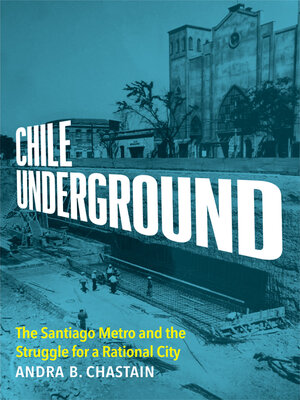Chile Underground
ebook ∣ The Santiago Metro and the Struggle for a Rational City
By Andra B Chastain

Sign up to save your library
With an OverDrive account, you can save your favorite libraries for at-a-glance information about availability. Find out more about OverDrive accounts.
Find this title in Libby, the library reading app by OverDrive.



Search for a digital library with this title
Title found at these libraries:
| Library Name | Distance |
|---|---|
| Loading... |
A fascinating historical examination of the Santiago Metro system as a microcosm of Chilean national identity during the twentieth century
The Santiago Metro, the largest urban infrastructure project in Chile's history, was designed in the 1960s in response to rapid urban growth. Despite the upheavals of Salvador Allende's democratic socialism (1970–1973) and Augusto Pinochet's military dictatorship (1973–1990), the project survived and is now the largest metro system in South America. What explains its success? How did its meaning shift under democracy and dictatorship? What does its history reveal about struggles for a more just city?
Drawing on Chilean and French archives, Andra B. Chastain demonstrates that Chilean-French relations and French financing were crucial to the project's survival during the Cold War. The Metro's history also illuminates the contested process of implementing neoliberalism and the unexpected continuities of state planning and visions for a rational city that persisted despite free-market reforms. Most important, this story shows that the Metro came to symbolize the nation and became a critical site where planners, workers, and urban residents contested Chile's path to modernity.
The Santiago Metro, the largest urban infrastructure project in Chile's history, was designed in the 1960s in response to rapid urban growth. Despite the upheavals of Salvador Allende's democratic socialism (1970–1973) and Augusto Pinochet's military dictatorship (1973–1990), the project survived and is now the largest metro system in South America. What explains its success? How did its meaning shift under democracy and dictatorship? What does its history reveal about struggles for a more just city?
Drawing on Chilean and French archives, Andra B. Chastain demonstrates that Chilean-French relations and French financing were crucial to the project's survival during the Cold War. The Metro's history also illuminates the contested process of implementing neoliberalism and the unexpected continuities of state planning and visions for a rational city that persisted despite free-market reforms. Most important, this story shows that the Metro came to symbolize the nation and became a critical site where planners, workers, and urban residents contested Chile's path to modernity.







